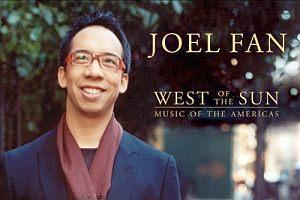Born in New York City in 1969 to Taiwanese parents, Fan first performed with the New York Philharmonic at age 11. His subsequent musical education, which included the Juilliard School, Harvard University (where he studied with Leon Kirchner), and the Peabody Conservatory (where he studied with Leon Fleisher), led to prizes at the D’Angelo Young Artists International Competition in the U.S. and Busoni International Piano Competition in Italy.
Fan’s commitment to a wide range of repertoire leads him to easily traverse the distance between world music, classical music of the 21st century, and music by Schumann and Beethoven. Just last month, he presented the New York premiere of William Bolcom’s often-droll Nine New Bagatelles in a club setting as part of a CD release party for West of the Sun.
Listen to the Music
Barber: Piano Sonata, Allegro con spirito
Fan’s rendition of Barber’s technically challenging sonata, whose knockout last movement was written at the insistence of Vladimir Horowitz, is the performance by which most listeners will judge his achievement. He acquits himself wonderfully, even when compared to Horowitz and speed demon Marc-André Hamelin. The Adagio is especially touching, and becomes more moving with repeated listening. Fan also manages to play the hair-raising final Allegro one second faster than Horowitz and seven seconds faster than Hamelin, yet never sacrifices musical coherence for dazzle. This state-of-the-art recording makes me hope that Fan will soon return to the Bay Area, not only to record a third CD at Skywalker Studios, but also to perform a full-length recital.

